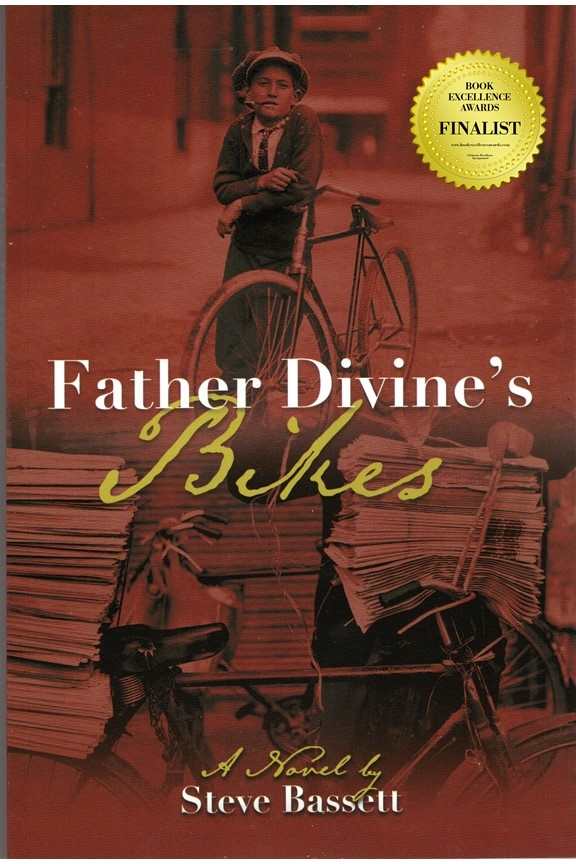
Father Divine's Bikes
Father Divine’s Bikes is a haunting historical novel about a city’s coming of age.
Steve Bassett’s novel, Father Divine’s Bikes, exposes postwar Newark’s underbelly.
Following two related murders, circulation wars between major newspapers bring several layers of crime to a head. Teenagers run numbers for bookies under the guise of being paperboys. Mobs run the numbers racket and vie for dominance, bribing police to look the other way. Civic and religious institutions are helpless to stop the corruption. Meanwhile, the difficult 1940s economy leaves the working class families of Newark’s Third Ward vulnerable to these illegalities.
Individuals’ back stories take up the bulk of the book. Officer Gazzi, who’s reassigned to the Third Ward after previous foul ups, is no match for its crafty criminals. Murder detectives McClosky and Cisco answer to the mafia as well as their police boss. Billy, one of the few rich kids in the neighborhood, finds an unlikely ally in Marvin, the only black person among a gang of Catholic friends. Father Nolan, a military chaplain in his first parish, feels that he’s in over his head. His altar boys, Richie and Joey, take on risky work offered by Father Divine’s men in order to help their families. Eli, a Jewish art dealer who fled Germany, also works for Father Divine. He supplies the boys bikes for their routes from his pawn shop. Father Divine serves Newark’s growing black population. Richie the Boot and Longy Zwillman are the other competitors for power, though their stories are not told.
Together, these characters’ stories capture a city laboring under ethnic conflicts, rent hikes, and profiteering. Newark is centralized as each characters’ monumental hardships point to the importance of a collective effort toward change.
Dialogue is the primary descriptive vehicle. Slang and regional accents enhance the novel’s diverse and cosmopolitan flavor. Sassy gestures, revealing attire, minimal food, and verbal nuances are emphasized over environmental details. The tone is biting and spare, reflective of life on the edge of desperation. Lusty and pornographic images play a big role among the male-dominated cast, who also approach murders as a par-for-the-course matter. Alongside the bleakness, moments of understated friendship help to overcome divisions. Allegiances between Joey, Marvin, and Billy, each an outsider in his own way, are a hopeful touch.
Though the book’s beginning is laborious, spent sizing up the players and explaining their motives, the book’s conclusion is decisive and intense. If the pacing is uneven, it highlights Newark’s uneven playing field. Boys try to act like men in their taunting and competitive play. Yet, the cutthroat world in which they take part puts them more at risk than they want to believe. The intrigue of the newspaper war pales in comparison to the overarching depravity in the city. Gang conflicts, the numbers game, and Father Divine’s connection between these and to the boys is of interest.
Father Divine’s Bikes is a haunting historical novel about a city’s coming of age.
Reviewed by
Mari Carlson
Disclosure: This article is not an endorsement, but a review. The publisher of this book provided free copies of the book and paid a small fee to have their book reviewed by a professional reviewer. Foreword Reviews and Clarion Reviews make no guarantee that the publisher will receive a positive review. Foreword Magazine, Inc. is disclosing this in accordance with the Federal Trade Commission’s 16 CFR, Part 255.
